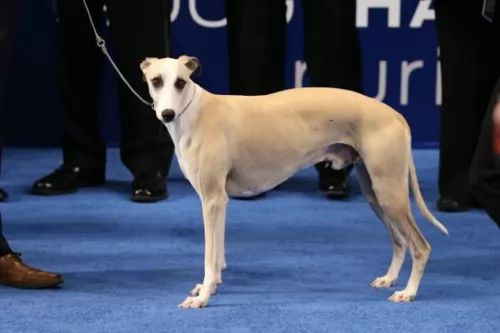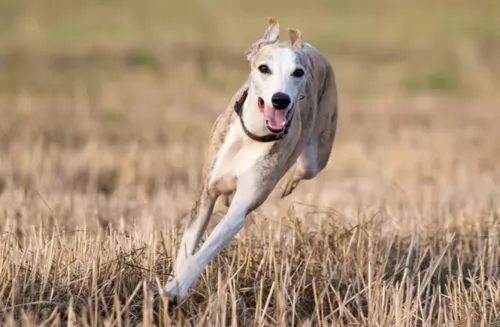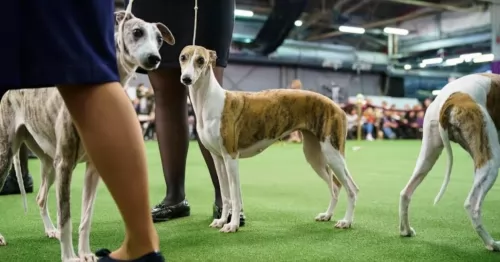 Petzlover
Petzlover Drever is originated from Sweden but Whippet is originated from United Kingdom. Drever may grow 18 cm / 7 inches shorter than Whippet. Both Drever and Whippet are having almost same weight. Both Drever and Whippet has almost same life span. Drever may have less litter size than Whippet. Both Drever and Whippet requires Low Maintenance.
Drever is originated from Sweden but Whippet is originated from United Kingdom. Drever may grow 18 cm / 7 inches shorter than Whippet. Both Drever and Whippet are having almost same weight. Both Drever and Whippet has almost same life span. Drever may have less litter size than Whippet. Both Drever and Whippet requires Low Maintenance.
 The Drever dog hails from Sweden, being brought from Germany to the Scandinavian country in 1910. As a scenthound, in spite of his short legs, he was once used for hunting purposes, having a keen nose.
The Drever dog hails from Sweden, being brought from Germany to the Scandinavian country in 1910. As a scenthound, in spite of his short legs, he was once used for hunting purposes, having a keen nose.
The dog was developed from the Westphalian Dachsbracke and then crossbred with other Swedish hounds.
By the 1940s there were two distinctive sizes of this Dachsbracke dog and the larger one was named Drever. It was in 1947 that the Drever was then recognized by the Swedish Kennel Club as a separate breed. It was also recognized by a number of other clubs and registries.
 You can just see that Whippets are designed for speed with those super lean, slender bodies. They were developed by crossing Greyhounds with smaller terriers.
You can just see that Whippets are designed for speed with those super lean, slender bodies. They were developed by crossing Greyhounds with smaller terriers.
In open areas, they can pick up a high speed. In the 19th century in certain parts of England, they were used in races. They actually originated in England.
The Whippet is an ancient dog breed if you can go according to artwork which dates back to ancient Egyptian times.
They were also known as Snap dogs or small Greyhounds. You can say that the modern Whippet emerged in 1891. This was when the Kennel Club gave the breed official recognition. It was in 1888 that the dog was recognized by the American Kennel Club.
 Looking quite similar to the Beagle, the Drever is a medium sized dog which stands at about 32 – 38cm and weighing between 14 and 16kg.
Looking quite similar to the Beagle, the Drever is a medium sized dog which stands at about 32 – 38cm and weighing between 14 and 16kg.
He has a fairly long body but unlike the Dachshund his short legs are straight and aren’t bent. The nose of the dog is fairly large and black and the ears are quite long, much like a Beagle dog.
The eyes are bright, alert and dark and the expression on the dog’s face is amicable and gentle.
He has a short, dense coat and is looked upon as a moderate to heavy shedder. The coat can be in several colors such as brown or tan and black with white markings over the face, neck, chest and feet. He has floppy ears and a long tail carried downwards.
 The Whippet is a medium-sized sighthound breed standing at between 45–56cm in height and weighing anything between 6 and 13kg.
The Whippet is a medium-sized sighthound breed standing at between 45–56cm in height and weighing anything between 6 and 13kg.
They descended from Greyhounds, resembling them in looks, just smaller. They are part of the Hound group, It’s a deep-chested dog with a long, lean head with fairy large eyes, a long neck, floppy ears and slim legs. The tail is long and slender. The coat is short and smooth and comes in many colors – tan, silver, black white, brindle and bi- or tri-colored.
The Whippet loves to run but when they’re not prancing around, they love spending time with their human family and that includes other pets as well as children.
They’re demonstrative and love showing their love for their family. They’re able to adapt to life in the city or the countryside but they will need exercising.
This is also a dog that rarely barks. They’re willful dogs so will do well with training and socialization. In fact, without proper socialization, they can become timid in unknown environments. They're intelligent so wont have problems with learning.
If you’re looking for a good watchdog and protector, you won’t find these characteristics in the Whippet.
 The Drever dog is an easy dog to have around, not requiring any special treatment to keep him happy.
The Drever dog is an easy dog to have around, not requiring any special treatment to keep him happy.
He gets on well with every member of the family as well as any pets in the home and fits easily into city- or country life.
He is an active dog however, and will require exercising to avoid him becoming frustrated.
Treat your amicable Drever with the attention he deserves and you’ll have a friendly, calm and devoted pet who wants to be your best friend.
 When you bring a sweet-natured Whippet into your life and home you’ll discover that apart from reveling in having a good run, their next favorite thing is to be resting quietly wherever their human companions are.
When you bring a sweet-natured Whippet into your life and home you’ll discover that apart from reveling in having a good run, their next favorite thing is to be resting quietly wherever their human companions are.
They’re docile dogs, loving to snuggle up to you, and not enjoying the cold. These quiet, gentle dogs are totally non- aggressive, just wanting to be with you, making you a splendid companion and pet.
 The Drever is a dog which enjoys good health generally, and with good care he can reach 12 to 15 years of age. The Drever, similar to other dogs, may be susceptible to some common health concerns that any healthy dog can experience such as back pain, hip dysplasia, eye diseases, obesity, diabetes and others.
The Drever is a dog which enjoys good health generally, and with good care he can reach 12 to 15 years of age. The Drever, similar to other dogs, may be susceptible to some common health concerns that any healthy dog can experience such as back pain, hip dysplasia, eye diseases, obesity, diabetes and others.
Veterinary care is an important part of a dog’s health – from puppyhood to the senior years. However, the frequency of visits you make to your vet with your adult dog will depend on his health.
 The lean Whippet doesn’t have any particular health problems but it is always a good idea to be clued up on some of the more common dog diseases there are.
The lean Whippet doesn’t have any particular health problems but it is always a good idea to be clued up on some of the more common dog diseases there are.
Buying a Whippet puppy from a responsible breeder will help with ensuring a healthier dog as dogs like these have had a good start and will have been vaccinated and dewormed.
This is when the heart of the dog beats too fast or too slow or it may even skip a beat. It is fairly common in dogs and it could indicate a more serious underlying condition.
An irregular heartbeat can bring about physical weakness and even loss of consciousness. Your veterinarian will want to examine your dog and listen to the history of symptoms and events that could have led to the condition. Your vet will then discuss treatment.
 It is important to feed your dog food that will cater to his digestion. That is why some of the best commercially manufactured foods are so good – they cater specifically for a dog’s age, his size, his activity levels and for any illnesses he may have.
It is important to feed your dog food that will cater to his digestion. That is why some of the best commercially manufactured foods are so good – they cater specifically for a dog’s age, his size, his activity levels and for any illnesses he may have.
In terms of activity levels, the Drever is an active dog, quite capable of chasing prey for long distances without tiring. This is why some dog foods are breed- and activity specific.
A good brand of kibble mixed with some cooked brown rice, vegetables and chicken will be excellent for your pet. Remember, if at all possible, to include some raw meat into the diet from time to time. Cool, fresh water should be available at all times.
Maintaining your Drever’s short, coarse coat won’t be a hassle, and you can call him a low maintenance dog. All that is essentially required is for you to give his coat a good brush twice a week. Nails will also need to be checked as well as his ears. Ignoring his ears can lead to wax build up and dirt and this can result in infection.
 Whippets love running so if you’re lucky to live on a farm or at the beach, he will love those short bursts of speed in open places, chasing a ball. You can take him for a walk every day too.
Whippets love running so if you’re lucky to live on a farm or at the beach, he will love those short bursts of speed in open places, chasing a ball. You can take him for a walk every day too.
Whippets are looked upon as low maintenance dogs that don't shed much. A good brush twice a week will be adequate for this slender dog. The skin is vulnerable to cuts so check him over when you’re brushing him and make sure he hasn’t any sores or scrapes on the skin.
How much your adult dog eats depends on his size and his activity levels. Dogs are individuals and not all Whippets will eat the same amount of food. Puppies require 4 bowls of food a day while the adult Whippet will want 2 bowls of food.
There are excellent dry kibble dog foods on the market but your Whippet will also like some home-made food like chicken and vegetables. The quality of dog food you provide for your Whippet will make a huge difference to his health.